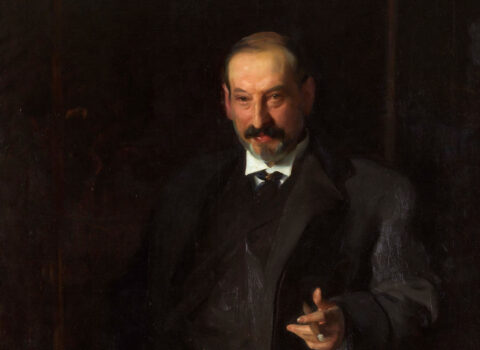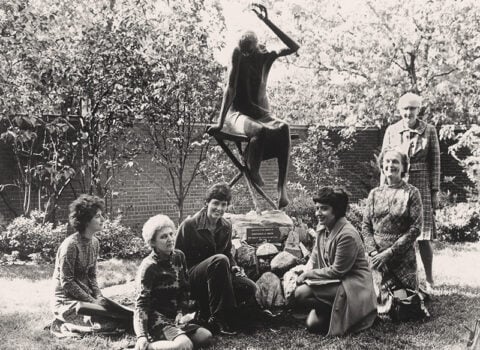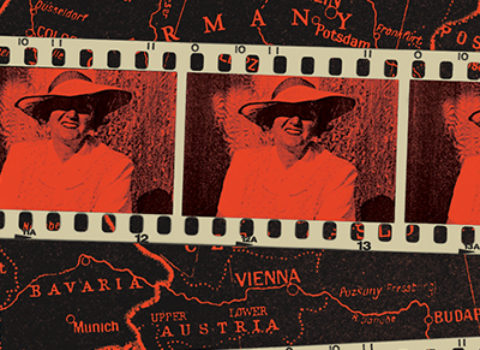Discussed in this essay:
Your Duck Is My Duck, by Deborah Eisenberg. Ecco. 240 pages. $26.99.
Ifed my cat. I fed my fluffy gray cat. After I fed my fluffy gray cat, she curled up beside me, licked her paws, and drifted off to sleep. The increasing complexity of these sentences demonstrates the essential quality that Ernst Friedlander, a philosopher of language, believes separates humans from the rest of the animal kingdom: our ability to piece together small mental units to create “thought entities.” Other animals can communicate with one another through types of language, but only humans can use linguistic systems to connect small concepts to construct larger ones—to “merge expressible things into other expressible things to make more and more complex expressible things.”

Illustration by Demetrios Psillos
There is no philosopher Ernst Friedlander—he is a creation of Deborah Eisenberg, the fiction writer. But his theory of language works strikingly as a blueprint for the way Eisenberg, in five short collections published at stately intervals over the past thirty-two years, has been remaking the conventions of the short story, particularly the way it conveys the pace and rhythm of human life. Her fiction is made up of what Friedlander would call mental units—vignettes lasting anywhere from a few sentences to a few pages—that build a larger landscape. More often than not, the pattern they create is complex enough to require at least two or three reads to make sense of all that is going on. Truths unfold slowly and incompletely; ambiguity is built into each story’s DNA.
There’s something of Norman Rush in Eisenberg’s manically intelligent narrators, something of Joan Silber in her elaborate structures, something of George Saunders or Margaret Atwood in her dystopian visions. But the experience of reading Eisenberg is radically alien. It’s challenging to sum up or even describe her fiction, because the action is almost entirely interior. Consider “Some Other, Better Otto,” from Twilight of the Superheroes (2006), which opens with a dialogue between Otto and his partner, William, about a family obligation. Otto, it turns out, is estranged from his relatives, his communications with them reduced to sending lavish gifts and receiving their “recriminatory little thank-you notes.” The only family member with whom he remains close is his sister Sharon, who is schizophrenic. Her illness gradually becomes evident during a brilliantly realized scene in which Otto and William visit her in her apartment. We’re told early on that she spends a lot of time at the planetarium, and since Otto has just been recalling the mathematical brilliance she displayed as a child, we assume that she must work there. By the end of the scene, it’s obvious that she could only be a visitor. Her mental condition is communicated with almost impossible delicacy, in the distance traveled from initial assumption to final understanding.
From Chekhov to Alice Munro, Hemingway to William Trevor, the short story tends to explode in a brief, brilliant hit of oddness or awareness. But epiphany has never been Eisenberg’s style. The usual contrivances of fiction—the cunningly placed symbols and neatly drawn arcs—depict life the way we want it to be, studded with meaning beneath the surface. Much of Eisenberg’s genius lies in forswearing these contrivances to create something much closer to the way life actually feels.
“I never start with anything,” Eisenberg said in an interview with The Paris Review conducted in 2013, while she was working on the stories included in Your Duck Is My Duck, her first new collection in twelve years. “It has to feel as though a totality that was hidden from me is being revealed. . . . There’s a feeling that everything is rushing toward something—turning into an arrow headed at a target.” That target, in the context of an Eisenberg story, is the highly specific circumstances of the life under investigation. But in Your Duck Is My Duck, Eisenberg seems to have in her sights a more general—and extremely pessimistic—assessment of American life. “Maybe I’ll come back to the States just to regroup for a bit, though god knows it’s finished there, isn’t it—really, truly finished,” one character says. Many of the stories were originally published between 2011 and 2015, but their vision of decline speaks excruciatingly to our current moment. It’s not just in the specifics—the effects of climate change, the decrepitude of the New York City subway—but in the sense of malaise, both emotional and political, that despite flashes of humor (Eisenberg can be a very funny writer) hangs over this collection. Eisenberg has said she thinks of fiction “as a kind of inquiry into what it is to be a human and what it is to be a human now.” What is most startling is not her assessment of American decline but the realization that it has been going on for so long.
Entering Eisenberg’s fiction is like diving off a cliff into a freezing lake: you are plunged into a world of confusion, with no one to help you get your bearings and no recourse but to struggle your way to the surface. Her openings are trapdoors, pushing the concept of in medias res as far as it can go.
I had lit a fire in my fireplace, and I’d poured out two coffees and two brandies, and I was settling down on the sofa next to a man who had taken me out to dinner when Ivan called after more than six months.
(“Transactions in a Foreign Currency,” from Eisenberg’s 1986 debut.)
“I don’t know why I committed us to any of those things,” Otto said. “I’d much prefer to be working or reading, and you’ll want all the time you can get this week to practice.”
(“Some Other, Better Otto.”)
Way back—oh, not all that long ago, actually, just a couple of years, but back before I’d gotten a glimpse of the gears and levers and pulleys that dredge the future up from the earth’s core to its surface—I was going to a lot of parties.
(“Your Duck Is My Duck.”)
It will take the entire story that follows—rarely less than thirty pages—to unpack the full significance of the first moments. Eisenberg’s process is one of radical immersion: We’re plunked down with a group of characters and, for a moment, given full access to their thoughts and feelings. Then we’re off to plunge into a new scenario, knowing nothing.
The opening of “Taj Mahal,” the second story in the new collection, takes Eisenberg’s usual method and doubles it. “I was a difficult little boy, and when my mother’s chronic illnesses made it impossible for her to care for me, she packed me off to her errant father, the filmmaker Anton Pavlak.” Rather than straight narration, this is a decoy opening line that introduces not the story proper but a perfect parody of a sad-child-of-a-celebrity memoir. It continues for paragraphs of melancholy pseudoreminiscence before another voice finally cuts in: “What to do with all this horseshit?” This is Emma, the story’s true narrator. The daughter of the (fictional) actress Zoe Sills, Pavlak’s former lover, she has only the briefest cameo in the book, but she’s been included nonetheless among a gathering of aging stars, her mother’s old friends, who drifted apart over the years but have reunited to grouse over a memoir just published by Clement Rouse, Pavlak’s grandson. “Pure gossip and invention! Were any of them interviewed? Were any of them even contacted? No!” The technical term for this thought channeling is free indirect discourse, and it’s a specialty of Eisenberg’s. She moves here from inhabiting the group as a whole, in a kind of chorus, to coming to rest within the thoughts of Emma, who is peripheral to the scene but central to the story. Like most of Eisenberg’s narrators, she is perceptive enough to understand just where the limits of her knowledge of others lie.
As the actors around her continue to talk, Emma sifts through her memories. Her one brief encounter with Rouse, whom she thought of as Clement the Mouse. Her unsettled childhood, spent shuffling between her father and stepmother on the East Coast and her mother’s luxurious house in California. Her mother’s affair with Duncan MacGregor, her co-star in a movie by Pavlak. Zoe’s humiliation as an aging Hollywood star—she eventually has to play the mother of a male actor who is older than she is—and her early death. Emma’s own failed marriage; her undemanding job at the parks department (a disappointment to her mother); an affair with a married colleague that ended badly and her introduction, the night before, to his new wife. Another writer might generate an entire novel from just a few of these elements. Here, each is raised, examined, and discarded.
On the surface, “Taj Mahal” is a story about people coming together, reunited (albeit briefly) by Rouse’s betrayal of their memories. But it’s truly a chronicle of disintegration, tracing back over their lives in search of the threads that once connected them. Eisenberg makes the metaphor explicit in a single lovely line:
Emma sighs and brushes a tiny crumb off her sleeve, as if she were brushing away a loose filament of the tattered web spun out since Adam and Eve between the little figures continually replenishing across the earth’s surface.
Even as the gathering is ending, Emma is already struggling to preserve it. “Do you remember that day, she thinks, when we got together and we talked about some stupid book? We were all together, and it was a perfect day, that perfect fall day—do you remember?”
Eisenberg’s characters have always felt disconnected from one another and from the world. “Like It or Not,” from Twilight of the Superheroes, looks initially like the setup for a romance—an American woman, visiting friends in Italy, accompanies a man she has just met to a hotel—but turns out to be a story about how little of what we assume about others is true. That sense of disconnection—interpersonal, interfamilial, intergenerational—is the dominant theme of the new collection. In “Cross Off and Move On,” the nameless narrator collates the scraps of all she does and doesn’t know about her family’s past through the figure of her mother, a would-be actress who wound up working as a coat checker in a nightclub and whose poisonous comments erode the relationship between the two of them. A trio of aunts, the sisters of the narrator’s absent father, offer solace from her mother’s bitterness, along with wisps of information about the past, including the revelation that her mother’s family was Jewish. Years go by; the narrator leaves home and becomes estranged from her mother; eventually she returns for the funeral of one of the aunts, accompanied by her husband.
The story’s trigger is the narrator’s discovery of a newspaper obituary of her cousin Morrie, a concert violinist. (When she was a child, her mother liked to say that “when you hear Morrie play the violin you believe he really will have a great future, as an accountant.”) Her first reaction is to call her husband, even though they are separated. “I fiercely wanted him to come by, but only if he was going to be a slightly different person, a person with whom I would be a different person—a pleasant, benign, even-tempered person,” she says. It’s typical of Eisenberg’s method that we never learn why they split up, even as the story circles back over the narrator’s childhood, through the funeral of the aunt and her husband’s encounter with her family. (He assesses her mother to be “as mean as a mace.”) The story ends well before its beginning, with the narrator and her husband taking a vacation after the aunt’s funeral, but it forecasts their eventual break. He had seen her looking through her mother’s drawers and asked what she was searching for.
Looking back, I suppose the future—its chilly plan for us—had cast a fleeting shadow over him and he was searching for what I would need him to say to me when the time came. But back then in that fragrant garden, I was aware only of the light coursing between our clasped hands and the sun’s warmth on my face, with night idling where it was, half a world away.
“Recalculating” tells a similar story from a different perspective. Here Adam, an unusual child in a conventional Midwestern family, becomes fascinated by his mysterious uncle Phillip, who left home at an early age and settled in Europe—“a secret person . . . who had just slipped out of the family pictures.” Even the one remaining photo of him is blurry. One day the family receives word that Phillip has died, and Adam, at loose ends after finishing college, decides to attend the memorial service in London. There he meets Vivian, who was Phillip’s girlfriend before he settled down with Simon. “The 23 percent of him that was heterosexual, he said, had loved her passionately and exclusively.” When the narrative switches to Vivian’s point of view, we see Phillip from another angle, more intimate but no more complete.
The story ends many years later, with Adam, now middle-aged, encountering Vivian again at a ceremony to honor Phillip’s contributions to sustainable architecture, which Adam helped to realize. The reader whose attention strays for even a second will miss the hint of something that took place between Adam and Vivian during their meeting in London many years before, another step in the dance of connection and disengagement. And now the story reaches its true subject, the passage of time. How does it happen, exactly, that we all get older? It is the common denominator of human experience, but no one can quite grasp it. After the ceremony, Adam’s wife takes a picture of him to send to their small daughter at home: “Almost instantly she’d receive a photo of what was just about to be the world’s very latest moment—by then so long elapsed!” “Don’t move,” Adam’s wife warns as she presses the button, bringing the story full circle.
The specter of American political decline hangs so palpably over this collection that it’s almost a relief to find it made explicit in the epigraph to “Merge”: “I know words. I have the best words.” The quote is, of course, Donald Trump’s. This story—at nearly sixty pages, it’s more of a novella—is the only one here that hasn’t been previously published, and it’s a masterfully executed meditation on the breakdown of everything: family, relationships, language. Its eighteen numbered sections shuffle among Cordis, the elderly widow of Ernst Friedlander; her neighbor Celeste, an aid worker in her late twenties; and Keith, a recent college graduate who, after forging a check from his ultra-wealthy father—the CEO of a corporation that has profited from destroying the developing world—has abandoned his phone and laptop and is trying to live “off the grid” in New York City. He’s a rich kid whose thoughts betray his sense of entitlement: when Celeste, whom he meets while she is walking Cordis’s dog, tells him she is going to Europe for a month on a humanitarian project, he is shocked to learn that her destination is Slovakia. “That was what she meant by Europe?” Asking her to coffee, he’s self-conscious that someone from school (Princeton) might see him with her, a “rather soft-looking girl with . . . badly cut hair falling over her big, round glasses.” But partly out of attraction, partly because he needs a place to stay, he starts sleeping with her.
By the time the story begins—their meeting is told as a flashback—Celeste has departed on her trip, leaving Keith to reluctantly assume her duties checking in on Cordis. (She did it for free, but Keith insists on a token salary.) Cordis lives alone; twenty years ago, while excavating a prehistoric site on a remote island, presumably to investigate his theories of how human speech developed, her husband disappeared. Cordis believes he had become disillusioned with language, “the tool that doesn’t work.” Perhaps he was more disappointed with the people who used it:
An extremely plastic faculty, amenable to many uses, but it developed to serve the pressing demands of malice, vengefulness, and greed—humanity’s most consistent attributes—providing individuals with the means, through lies, boasts, propaganda, fearmongering, advertising, derision, and outright threats, to subjugate others. If that’s what you want to call intelligence, go right ahead, he said; how proud we were to be able to articulate our misconceptions, our limited, distorted views and visions!
The story seesaws between the corruption of our communication-saturated lives—Cordis’s mailbox overstuffed with junk, an ex-girlfriend of Keith’s who texts constantly and meaninglessly, a laptop with “idiocy . . . violence . . . confusion coursing through its tiny electronic veins”—and a vision of a more authentic way of communicating after all the artificial connectedness is stripped away. When Keith abandons his devices, he finds himself with a heightened sense of perception: “In the absence of his accustomed interface the bare, sharp vividness of things had begun to assail him; he felt like he was being etched. How great coffee was!” Meanwhile, Celeste, having completed her project, heads east to some unspecified destination, sending Keith postcards that become more and more cryptic. After an illness that leaves her delirious and dehydrated, she wakes up feeling “as though she has shed a heavy, suffocating hide. The loveliness in things has never been so apparent.” Someone has left her an orange, which she doesn’t seem to recognize: “something roundish, with a slightly bumpy, mottled, copper-colored surface . . . the covering peels right off, disclosing a globe composed of tiny, iridescent segments.” Is she dreaming? Is she dead? Regardless, she’s found her way back to an uncorrupted form of speech. But Keith, receiving her postcards, cannot decipher them.
“My stories are getting more complicated, or complex,” Eisenberg said in her Paris Review interview. “They encompass more than they used to, because my aspirations have grown.” Eisenberg has long had an interest in the US government’s involvement in foreign affairs, especially in Latin America, where she spent time traveling during the Eighties. A small subset of her stories has been devoted to the subject of Americans wreaking havoc abroad, either by accident or intentionally. In “Someone to Talk To,” from All Around Atlantis (1997), an American pianist is invited to perform at a music festival hosted by an unidentified Latin American country with a sketchy political scene. As his host explains, “We’re hoping the festival will help to . . . rectify the, ah, perception that we’re identified with the military here.” The mood of the story is darkly comic, particularly during the pianist’s encounter with a British journalist who has been driven to the brink of insanity by his unwitting complicity with the corrupt system. Now, however, Eisenberg finds no humor in such scenarios, only the decadence and decay of those who still cling to the vestiges of colonialism.
In the title story of her new collection, an American painter accepts an invitation from a wealthy expatriate couple, Ray and Christa, to spend time at their “beach place” in an unspecified Latin American country. In a surreal touch, her fellow guests are a group of accountants (whose presence is never explained) and another artist, Amos Voinovich, who creates politically oriented puppet shows. The painter—again, we don’t learn her name—is going through a breakup, but her emotional distress feels larger than her personal circumstances. She’s recently visited a doctor who wants to determine why she has insomnia.
“What’s to figure out?” I said. “I’m hurtling through time, strapped to an explosive device, my life. . . . It’s not so hard to figure out why I’m not sleeping. What I can’t figure out is why everybody else is sleeping.”
She finds no peace at the estate. Ray is sleeping with a supermodel who has moved nearby after discovering the place during a photo shoot, and his marriage to Christa is in disarray. A line of refugees waiting all night for boats is visible from the window. Drought, flooding, and fires caused by the eucalyptus trees that Ray ill-advisedly planted everywhere have made the land uninhabitable. The show that Amos will create while staying there, called “State of Emergency,” depicts serfs and donkeys conspiring with bats to rise up against their masters. Amos and the painter bond in their shared discomfort. “It’s odd—no matter how you feel about a place, it’s as though you exchange something with it. It keeps a bit of you, and you keep a bit of it,” the narrator tells him when they’re back in New York. “The thing you mostly get to keep is leaving,” he replies.
The story takes its title from a Zen riddle that Ray refers to one night over dinner, involving a Zen master, his disciple, and a duck that is trapped in a bottle. In the actual riddle, the master poses his disciple the conundrum of how to get the duck out without hurting it or breaking the bottle. Whatever lesson he intended remains obscure. But Ray drunkenly suggests an answer: “It’s not my duck, it’s not my bottle, it’s not my problem.” In a book in which titles tend to the inscrutable, this one feels like a shot in the arm. No matter what Ray and Christa may think, responsibility can’t be shrugged off so easily. Your problem is my problem—your duck is my duck. The things we do elsewhere will come home to haunt us. Perhaps they always have.









































































































